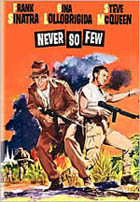
BUY IT AT AMAZON:
CLICK HERE!
STUDIO: Metro-Goldwyn-Mayer
MSRP: $15.98
RATED: Not Rated
RUNNING TIME: 124 Mins.
SPECIAL FEATURES:
• Theatrical Trailer
• DVD Trailer – “Wanted: Dead Or Alive”
Note: This DVD is part of The Essential Steve
McQueen Collection (Save your hard earned cash and purchase it from CHUD
immediately!)
It’s interestingly enough the one Steve McQueen DVD in his Essential Boxed Set doesn’t really include McQueen, at least not enough for one to be fully satiated. Technically, Never So Few was a vanity project for the films’ major star Frank Sinatra and with just cause. McQueen wasn’t really much of a star at this point, but as the DVD mentions, Sinatra pestered maestro filmmaker John Sturges just enough to give him some favorable camera angles. While in retrospect those angles aren’t really favorable (McQueen’s actions are more so) as much as they add more screen time to the veritable newcomer (fresh off of TV’s Wanted: Dead Or Alive). Thus, the pact between the rising star and the working director would segue its way into The Magnificent Seven (which I suggest you see, oh, I don’t know, immediately) and then onward onto one of the greatest films ever made: The Great Escape (which needs no explanation, even this one).
As for Never So Few, the film doesn’t garner enough steam to make it relatively worthwhile, let alone the problems within the course of its narrative developments. Those problems account for the episodic feel within the narrative course of events, ones in which for a supposed war film (check out the cover art as it fools you), doesn’t feel like our main heroes were involved with the conflict compared to others.
The Flick
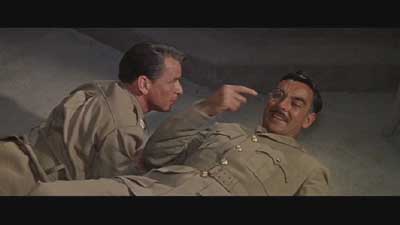
"Then, like Cruise, they sprayed me right here!"
Old Blue Eyes is Captain Tom Reynolds, the manliest man throughout the picture, the type of guy who takes no prisoners and doesn’t offer apologies for his actions. He does what he feels is right, come any series of consequences. Reynolds speaks in absolute items (he’s a Sith!), which could lead you to believe, coupled with his Australian-influenced hat, that he’s some crazy-eyed bushwhacker who’s in desperate need of a wake-up call from the Generals. These things don’t diminish from his persona, but rather aid in creating the father figure of his faithful men toughing it out in World War II Burma.
His mission, alongside his O.S.S. brethren, is to train 324 Kachin rebels in modern warfare with the express purpose of holding off the Japanese. Fitted at his side is Danny De Mortimer (Richard Johnson), the drole monocle wearing British officer who has been with Reynolds through the muddiest of it all. Their bond is unbreakable. They even play Nation’s Punched together! Also included in his team is the Navajo Sgt. John Danforth (played by Charles motherfuckin’ Bronson), who is there to be the heavy and add some much needed presence to the backfield lineup. After a rather quick attack on their forces, Reynolds is in dire need of a field surgeon, so he and Danny hit the road and journey back to headquarters for their checklist and of course, a little R&R. It is during these sectioned off sequences (they’re like clunky chapters against the backdrop of the raging war behind them) that Reynolds gets involved with Carla Vesari. Played by Gina Lollobrigida [Note from George: One of my absolute favorite screen names ever! It just rolls off the tongue.], it’s her job to be the beautiful girl, batting her eyelashes when Sinatra tells her that she’s going to get in the kitchen (and be his darling valentine, after she’s finished washing the dishes and making multiple truckloads of babies).
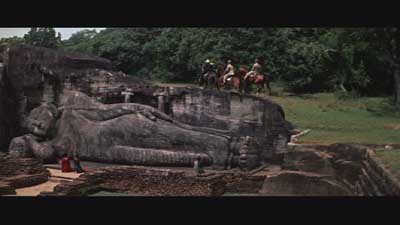
"Don’t mind us, we’re just destroying your National Treasure."
Carla’s caught up with the international man of mystery Paul Henreid (who you might know from Casablanca, among others), a man we can’t seem to figure out if he’s hording Carla or just allowing her leachy powers of living like Kato in his guest house. The bloodied glove comes in the form of Sinatra and Lollobrigdia’s sexual chemistry. These are two handsome people, and they know it. Using every blink, suave movement, eyebrow raise, plunging neckline, and sultry hip sway, the pair draws their relationship together like the Blob slathers his victims with pink sexual goop.
Sinatra’s called back to his duties (if the film hasn’t made you forget what he was doing in the first place), and he meets up with Cpl. Bill Ringa (the iconic Steve McQueen, even in this film), the tough scrapper of a man who knows the ins and outs of every situation … especially in Manhattan (which comes in handy, approximately never). What the newly formed trio doesn’t realize is that Danny is about to come down with a drastic case of malaria, so that puts them out of commission for a few more days. However, in all of their good fortunes, Danny is assigned Doctor Captain Travis (Peter Lawford), who is rather reluctant when Reynolds informs him that he’s going with them back to the Jungles, whether he likes it or not. There’s no room for argument in Reynold’s world, and as such, Travis is a little bit more than peeved.
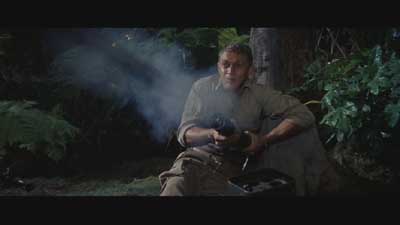
"Potatoes!"
It’s on Christmas where things start to get shaken up, because the Japanese force an all-out sneak attack on Reynolds and his group of merry Kachins. It is during these scenes where director John Sturges really shines, connecting with the material in a way that allows his stylistic qualities to bombard you with the horrors of fighting. I’m reminded of a long shot where Sturges pans and dollies downward, ratcheting in on the invading armies of Japanese soldiers, all shooting and sneering and being menacing. It’s perfectly fitting and utterly enthralling, bringing the right visual information across in a terrific way. Sinatra is shot during this course of events, along with many others, so after a long chat with new buddy Travis, he’s shipped back out to HQ at Assam, for, you guessed it, a little R&R.
As we awake with Reynolds in his hospital bed, we’re back in another episodic instance of the rather mediocre script at this point. Carla comes to visit and the pair isn’t getting along as well as they should. Sinatra is calling tomat-toes, and Carla’s saying tomot-toes. The whole thing is in danger of being called off. As the pair wrestles with their skewed relationship, Reynolds takes solace with his group of Men back in the Jungle. He’s under confidential orders by this point, and his target is to hit a rather strategic airfield in Ubachi. Again, by this point Sturges shows us his penchant for action sequences, allowing most of the beginning throws to be scored to traditional Japanese music the enemy forces are listening to on the radio. This accomplishes two feats, as it allows us to be more involved with Reynolds and his men’s sneak attack, and it also revs up the tension to unheralded levels.
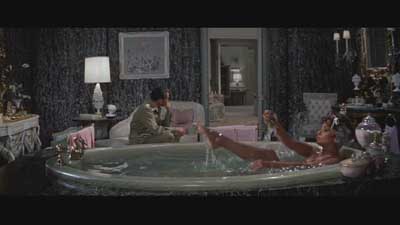
Fred was a little embarrassed when Lisa showed him how to pull it.
When all of the dust settles, it’s the horrors of war that pop up again, and this time Sinatra’s psyche is almost mimicked with what’s going onscreen, to a point. I only mention this because his whole civilian life is a mess of scattered proportions, torn apart by love, doing what he thinks is correct, and planning rather haphazardly for his future. What follows is a rather quick turn of sometimes shocking events, all fitting Reynold’s character, but ultimately rather standard, considering the mold of ‘war picture’ it fits itself into.
The most problematic aspect of Never So Few is its romantic aspirations, its B-plot machinations, and its general sense of putting it all together. Somewhere along the line the puzzle pieces don’t gel together. The Reynolds-Carla romantic scenes are sexist to the most extreme degree, on top of extremely meandering. Sinatra bluntly tells her: "your place, woman, is at the stove" before tossing out that he wants her: "barefoot and pregnant on the edge of town." Lollobrigida blindly agrees, as it is written, but I can’t help but feel these by-products of the era the film was made in are frightening in their implications. As for the subsequent B-plot, characters like Paul Henreid show up, make their speeches then promptly leave for good. Henreid doesn’t do anything worthwhile, per say, than just add an extra moment of two to place some tension on the Reynolds-Carla relationship. It doesn’t work because Carla’s ties to Nikko (Henreid) aren’t defined in any natural sense. Therefore, it’s odd and doesn’t work. Coupled together, these frequent moments chop the film up into a Jungle-War-Romance configuration that repeats itself, diminishing the feel I believe the filmmakers were attempting to go for. In another strong point, the film lapses in racist remarks every so often, which does not paint a pleasant picture of Asians in general. As the typical jingoistic pro-American film, no matter what they may be doing, the dialogue is blunt in characters mouthing off to one another, hate filled and spewing hellfire. Not that I’m calling the film racist, but to a degree, it does use the salty language soldiers undoubtedly used, and that might cause some viewers to be turned off.
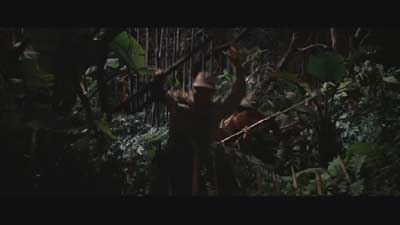
"Oh look! Fun Poles! I’ll go first! Wheeeeee!"
As for Sinatra, he injects a swaggering roughness (or just a carelessness, I can’t tell) into his role as Reynolds. It doesn’t feel like it’s a stretch for him, as a vanity project he fits the heroic mold of Reynolds, but doesn’t cover any new ground in believability. He’s done these types of roles before, and would continue to do them until his acting was pummeled into submission by the deadliest of all killers – old age. McQueen (seriously) really doesn’t get to do much, other than carry a machine gun and act rather bigger than he is (moralistically and physically). Still, this is a good starting role for the man, and his Ringa is a man who is filled with a freshness to jump into anything with a smile and a finger on the trigger. Ringa is the type of guy you’d want around when the shit starts happening and here, he brings as much as he can to the role. This is the type of role that starts careers, and McQueen passes admirably. He fits the mold pretty good, but he’s not quite the best thing about the movie. Charles motherfuckin’ Bronson, on the other hand, is one of the best aspects of the picture. Just showing up in a film would almost be enough to quell my awesome feelings for the man (yes, that’s the manliest man love you can have), but here he manages to play a Navajo and force you to have sympathies for his less than 10 minutes of screentime. His iconic, loved-by-the-camera status works tremendously for him, as it does towards McQueen (who isn’t in the movie half as much as Sinatra, or Richard Johnson, for that matter).
The positive aspects, besides some strong acting, include Sturges intense battle sequences, and his flair for the inner workings of men forced to do Herculean tasks. As such, he doesn’t leave time for women, and it’s a trademark of his to brush them off into the ether (he does this in more than a few pictures, like Bad Day At Black Rock). It’s also impossible to not think of the masterpiece Bridge Of The River Kwai when dealing with the torment of men in the Jungle, but Sturges works with what he has adequately and masterly. The musical score, provided by Hugo Friedhofer, is epic and thrilling. It permeates all of the right instances and adds the necessary emotional response for all aspects of the picture, even the ones I wasn’t too fond of. It’s a great musical accompaniment to the visual aspects of the film.
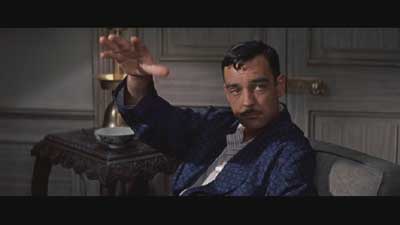
Toback’s remake of FINGERS was very minimalist.
When it’s all said and done, and entirely clichéd on my part, Never So Few is just too chopped up for my tastes against several backdrops that it can’t decide on focusing in on. It’s not terrible, just acceptable enough to check out.
6.0 out of 10
The Look
Scratchy and damaged at first (especially during the opening credit sequence), it looks particularly splendid once you get into the film (although instances of deterioration, through scratches, dirt/etc are still evident). Presented in the films original 2.35:1 Cinemascope aspect ratio, the cinematography by William H. Daniels is lush and controlled during the Jungle sequences (it feels soundstage’y in most parts), and painterly in others (check out the bedside scene, as actor’s faces look gorgeous). The DVD transfer is not bad considering the film is older than Bengalla and his line of superheroes who slam evil.
8.0 out of 10
The Noise
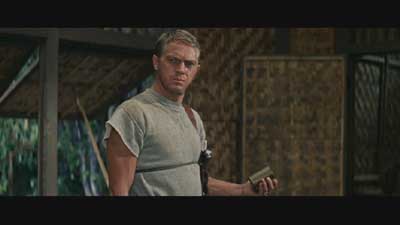
"Wait a second, you’re telling me this
was Brand X? Damn that Joker."
Remixed in Dolby Digital 5.1 audio. It provides a large range of sounds for your main channels, but doesn’t really branch out and give you the full immersion. Granted, WB is probably working with the film’s original four track sound (on the Cinemascope print), so what they’ve been able to squeeze from the aural noises, explosions, and whispers in the night is great.
8.5 out of 10
The Goodies
Barebones. In fact, trailers are the only extra addition.
The theatrical trailer (runtime – 2:41) is adequate, showcasing a variety of images from the film. Most of these shots are beautiful and enhance your interest in the film. Then it segues into the romance aspect of the film versus the war nature of the picture. It’s commendable, but nothing that’ll rock your socks off to Frogtown.
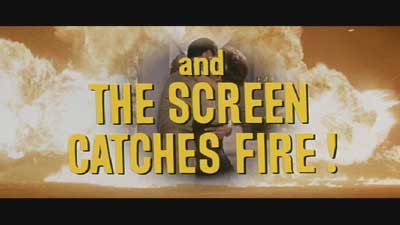
Holy Shit! Put it out! PUT IT OUT!
Finally there’s a DVD trailer (runtime – :31) for Wanted: Dead Or Alive. This was the signature McQueen break-out role, so check it out. The trailer’s a gigantic piece of fluff, showcasing a hard-assed McQueen fighting everyone and shooting up the place. Effective? Hardly. It’s way too short for starters.
3.0 out of 10
The Artwork
Deceiving original artwork. McQueen gets top billing on the DVD cover, but not in the film. He comes after the Title card. I do, however, enjoy the slapdash nature of the drawings, especially Sinatra in his Australian hat ready to pierce all comers into oblivion. The background on fire and the rushing troops add to sense of urgency, just the right mix to entice your eyes. McQueen, on the other hand, appears to be thrusting his bulging crotch at the enemy, and seems pleased beyond belief about it. How much, you ask? Enough to not fire his gun.
7.5 out of 10